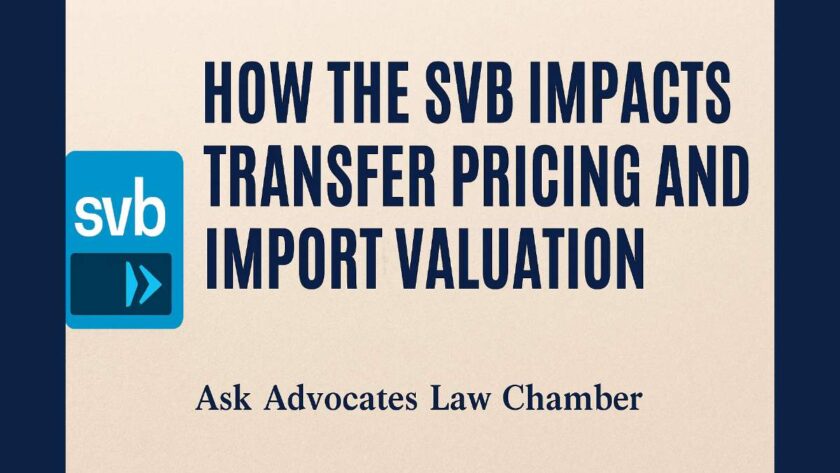In international trade, the relationship between importers and foreign suppliers often goes beyond mere business transactions. When both parties are related, questions about the correctness of import value naturally arise. The Indian Customs Department, through the Special Valuation Branch (SVB), ensures that the declared value of imported goods reflects the true transaction value. This process directly connects with transfer pricing principles and affects the financial and compliance frameworks of multinational corporations.
At Ask Advocates Law Chamber, our legal team understands the complexities of SVB investigations and their deep connection to transfer pricing and import valuation. Through strategic legal defense and compliance planning, we help businesses minimize risks and maintain smooth operations.
How the Special Valuation Branch (SVB) Impacts Transfer Pricing and Import Valuation – Legal Helpline: Ask Advocates Law Chamber
Understanding the Special Valuation Branch (SVB)
The Special Valuation Branch (SVB) is a specialized division within Indian Customs. It examines import transactions between related parties to ensure that prices declared on invoices are not manipulated to evade customs duties. This branch focuses on cases where the buyer and seller are subsidiaries, joint ventures, or have any direct or indirect control over each other.
The SVB’s role is crucial because related-party transactions often involve transfer pricing. While transfer pricing generally falls under the Income Tax Act, the valuation of goods for customs purposes comes under the Customs Act, 1962. Therefore, the SVB acts as a bridge between taxation and customs compliance, ensuring that import values are fair, transparent, and in line with international standards.
Why SVB Scrutiny Matters
When a company imports goods from a related foreign entity, customs authorities may suspect undervaluation. The SVB intervenes to determine whether the declared price truly reflects an arm’s-length value. This process not only prevents revenue loss to the government but also protects genuine importers from legal complications.
Companies that fail to comply with SVB procedures may face delays in customs clearance, additional duties, and even penalties under Section 111(m) of the Customs Act. Therefore, understanding and cooperating with SVB procedures is not just a compliance requirement but also a strategic necessity for smooth global trade operations.
The Connection Between SVB and Transfer Pricing
Transfer pricing involves the pricing of goods, services, and intellectual property between related entities across borders. Its main goal is to ensure that transactions occur at an arm’s-length price, meaning they reflect market value as if the parties were unrelated.
However, when these same transactions involve the import or export of goods, the SVB becomes relevant. The customs authorities must ensure that the declared import value aligns with the true transaction value. Consequently, both transfer pricing and SVB valuation share the same underlying principle: fair value.
Yet, they differ in purpose. Transfer pricing focuses on income tax and profit shifting, while SVB concerns customs duty and import valuation. Despite this difference, both frameworks often intersect. In many cases, the documentation used for transfer pricing compliance also supports SVB evaluations. Therefore, coordinated legal and accounting strategies are essential to avoid duplication, inconsistencies, or compliance risks.
Key Triggers for SVB Investigation
Customs authorities may refer a case to the SVB when specific risk factors appear in the import documentation. Common triggers include:
- The importer and exporter share common ownership or control.
- The imported goods are subject to royalty or license fees.
- There are special price adjustments or post-importation payments.
- The declared value seems inconsistent with comparable imports.
- The importer receives technical assistance or after-sales support from the supplier.
Once the SVB identifies these red flags, the importer must file a set of detailed questionnaires, agreements, and declarations. This includes inter-company agreements, transfer pricing reports, and financial statements. Any delay or incomplete response can lead to assessment delays and provisional duty payments.
The SVB Investigation Process
The SVB process begins with a reference from the assessing officer at the port of import. Once referred, the SVB issues a questionnaire seeking detailed information on the relationship between the buyer and seller. The importer must respond promptly, providing all relevant agreements and financial details.
After reviewing the submissions, the SVB may conduct hearings to understand the pricing mechanism, cost structure, and terms of trade. It may also examine royalty payments, technical fees, or management charges to determine if they affect the transaction value.
Finally, the SVB issues an order confirming whether the declared transaction value is acceptable under Rule 3(2) of the Customs Valuation (Determination of Value of Imported Goods) Rules, 2007. If adjustments are required, the importer must pay additional duties based on the revised value.
Legal Framework Governing SVB
The SVB functions under the legal framework of the Customs Act, 1962, and the Valuation Rules of 2007. Rule 2(2) defines related parties, while Rule 3 to Rule 12 outline the methodology for determining transaction value.
Section 14 of the Customs Act specifies that the value of imported goods shall be the transaction value adjusted for costs such as commissions, royalties, and transportation. When doubts arise about the declared value, customs officers invoke Rule 12 to verify its accuracy.
The SVB’s legal foundation ensures uniformity and fairness in customs valuation. At the same time, it maintains India’s alignment with the World Trade Organization’s Agreement on Customs Valuation.
The Role of Legal Representation
Legal representation plays a decisive role in SVB proceedings. Businesses often underestimate the complexity of documentation and valuation arguments required. A skilled customs lawyer can present the importer’s case clearly, ensuring compliance while protecting the client’s financial interests.
At Ask Advocates Law Chamber, our legal experts prepare detailed submissions, represent clients during hearings, and coordinate with transfer pricing advisors. We help importers demonstrate that their declared values are genuine and consistent with international pricing standards.
Furthermore, we handle appeals before the Commissioner (Appeals) or the Customs, Excise, and Service Tax Appellate Tribunal (CESTAT) if adverse findings arise. Effective legal advocacy often shortens case timelines and prevents excessive financial exposure.
SVB and the Importance of Documentation
Accurate documentation is the backbone of a successful SVB defense. Companies must maintain clear and updated records, including inter-company agreements, pricing policies, and cost sheets. Consistency between customs filings and income tax transfer pricing reports strengthens credibility before authorities.
In addition, importers should ensure that royalty payments, license fees, and technical service charges are transparently disclosed. Even minor inconsistencies between invoices and supporting documents can raise suspicion, leading to prolonged scrutiny.
A proactive compliance strategy, supported by experienced legal counsel, not only mitigates SVB risks but also enhances the company’s reputation for integrity in cross-border trade.
SVB’s Impact on Business Operations
The SVB process can influence multiple aspects of business operations. Delays in valuation clearance can affect production schedules, supply chains, and cash flows. Importers may have to furnish bonds or bank guarantees until the investigation concludes.
Moreover, any increase in assessed value can raise customs duties and downstream costs. Hence, effective planning and legal preparedness are vital. Businesses that integrate SVB compliance into their broader transfer pricing and supply chain policies tend to avoid disruptions and maintain stable import cycles.
Coordination Between Tax and Customs Authorities
The SVB and transfer pricing authorities share similar objectives but function under different laws. The Income Tax Department examines profit allocation among related entities, while the SVB focuses on import valuation.
However, coordination between these departments is increasingly important. The government encourages data sharing to detect inconsistencies in related-party transactions. Therefore, importers must ensure that their customs declarations and income tax filings align. Any discrepancy can trigger investigations from both sides, increasing legal exposure.
At Ask Advocates Law Chamber, we help clients establish a unified compliance framework. Our experts integrate customs valuation with transfer pricing documentation, ensuring harmony across regulatory filings.
Common Challenges Faced by Importers
Despite best efforts, importers often face several practical challenges during SVB investigations. Some of the most common issues include:
- Ambiguity in valuation adjustments for royalties and fees.
- Lack of clarity in defining control or related-party relationships.
- Prolonged investigation timelines leading to operational delays.
- Inconsistent interpretations of pricing policies by authorities.
- Repeated requests for information and document verification.
Our firm assists clients in managing these challenges through strategic planning, continuous follow-up, and effective representation. We ensure that the importer’s perspective is clearly presented and legally protected at every stage.
Strategic Legal Solutions by Ask Advocates Law Chamber
As a leading global force in legal defense, Ask Advocates Law Chamber combines deep domain expertise with strategic foresight. We advise clients from diverse industries such as manufacturing, technology, pharmaceuticals, and logistics.
Our approach includes:
- Conducting pre-import assessments to identify potential SVB risks.
- Aligning transfer pricing and customs valuation documentation.
- Representing clients during SVB inquiries and hearings.
- Managing post-investigation compliance and appeals.
- Offering training sessions for in-house legal and finance teams.
Through our holistic legal services, we help multinational companies navigate SVB complexities while maintaining full regulatory compliance.
Frequently Asked Questions
The Special Valuation Branch (SVB) is a specialized unit under Indian Customs that examines import transactions between related parties. Its purpose is to verify whether the declared import value reflects the true transaction value. It ensures that importers do not undervalue goods to reduce customs duties. SVB scrutiny helps maintain transparency and compliance with the Customs Act, 1962 and international valuation standards.
SVB and transfer pricing share the same principle of ensuring arm’s-length pricing between related parties. While transfer pricing applies under the Income Tax Act to regulate profit allocation, SVB applies under the Customs Act to verify import value. Both systems often use overlapping documentation, and any inconsistency between them can lead to scrutiny from both customs and tax authorities.
An SVB investigation is triggered when customs authorities find that the importer and supplier are related, or when they notice royalty payments, license fees, or other special pricing arrangements. If the declared value seems inconsistent with market value, the case is referred to SVB for detailed review.
Importers should maintain accurate inter-company agreements, transfer pricing documentation, and cost records. Full disclosure of royalty and technical fees helps avoid disputes. Engaging experienced customs lawyers ensures effective representation and timely responses during SVB proceedings.
Legal experts assist in preparing responses, representing clients during hearings, and ensuring compliance with customs valuation laws. They align transfer pricing and SVB documentation, defend against penalties, and protect the importer’s financial and legal interests.
Conclusion
The Special Valuation Branch plays a crucial role in ensuring transparency, fairness, and integrity in international trade. Its impact on transfer pricing and import valuation cannot be overlooked, as both areas are deeply intertwined. For global businesses, proactive compliance and expert legal guidance are essential to avoid disputes, financial losses, and reputational harm.
Ask Advocates Law Chamber stands as a trusted partner for companies navigating these intricate legal landscapes. Our experience, precision, and advocacy empower businesses to trade confidently while staying fully compliant with customs and tax laws. In a globalized economy, where every valuation counts, a well-prepared legal strategy makes all the difference.
Read More
- Analyze recurring tax conflicts, GST refund delays, and litigation pathways for disputed exemptions
- Resolving Tax Disputes Under STPI: Navigating Section 10A/10B Challenges
- Top 5 Compliance Mistakes in STPI Registration and How to Avoid Penalties
- When Can NCLT Refer a Case to Criminal Court?
- Oppression and Mismanagement Cases in NCLT – A Legal Roadmap
- Central Board of Indirect Taxes & Customs (CBIC) – Customs Division



